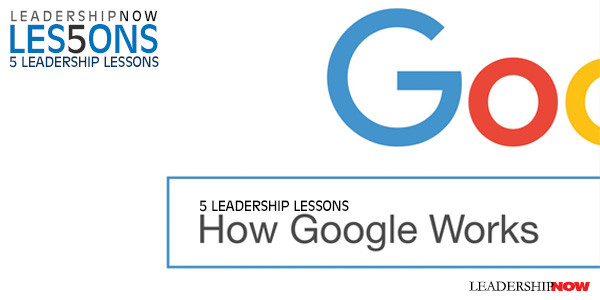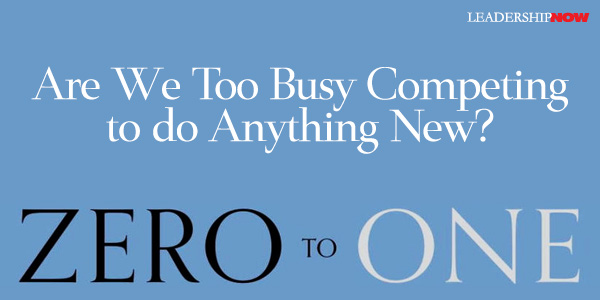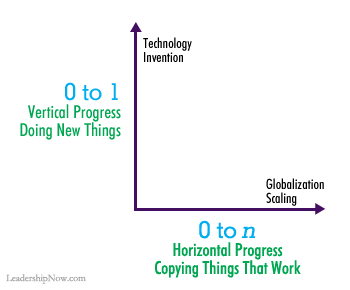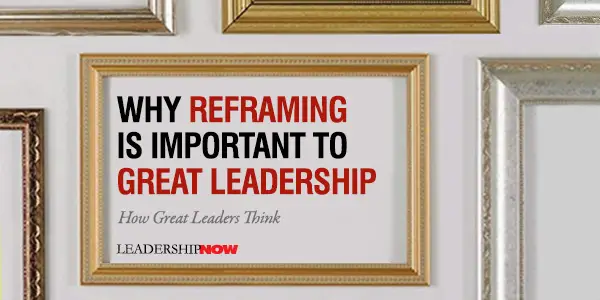 Leading Blog | Posts by Month |
 Leading Blog | Posts by Month |
09.30.14

LeadershipNow 140: September 2014 Compilation
See more on
Posted by Michael McKinney at 10:00 AM
09.22.14

5 Leadership Lessons: How Google Works
How Google Works by Eric Schmidt and Jonathan Rosenberg is how Google created its innovative and productive culture. 

Posted by Michael McKinney at 11:29 PM
09.19.14

Are We Too Busy Competing to do Anything New?
PETER THIEL’S Zero to One is a quick and engaging read, but the ideas are not as quick to digest. Zero to One is based on the idea that progress can take two forms: horizontal or vertical progress. Horizontal progress is doing more of what works—going from zero to n. Vertical progress is doing something new—going from zero to one. Thiel explains it this way: "Vertical progress is harder to imagine because it requires doing something nobody else has ever done. If you take one typewriter and build 100, you have made horizontal progress. If you have a typewriter and build a word processor, you have made vertical progress."  Most of us are busy making horizontal progress. We are competing—trying to better or make incremental improvements to what already exists. Certainly, there is a value in this, but it leads to the creation of commodity businesses. Thiel recommends: avoid competition as much as possible. Instead, be a monopoly. Monopolies occur when some is doing something no one else is doing. “Monopolies deserve their bad reputation—but only in a world where nothing changes….Creative monopolists give customers more choices by adding entirely new categories of abundance to the world.” To make a finer point, Thiel writes: “Every business is successful exactly to the extent that it does something others cannot. Monopoly is the condition of every successful business.” Part of the problem is that we have developed a mindset of indefinite optimism or hoping the future will get better with no plan—the future just-sort-of-happens approach. What we need says Theil is a mindset of definite optimism. That is to say, getting on with building the future you envision—working the plan. “Arguing over process has become a way to endlessly defer making concrete plans for a better future.” A definite optimist believes the future will be better if he plans and works to make it better. We need to get back to making a plan for the future. Successful start-ups and monopolies are built on a secret. “People at a successful startup are fanatically right about something those outside it have missed.” What everyone knows will not give you an edge. What we need to restore is our sense of adventure—our sense of possibility. Are we too busy competing to do something new?

Posted by Michael McKinney at 11:09 AM
09.04.14

Why Reframing is Important to Great Leadership
LEADERS need to be able to look at the situations they face from different perspectives. The need to be able to reframe a situation in order to understand what it really going on and deal with it effectively. A leader’s “ability to reframe sets them free” and helps them to “avoid getting trapped in cognitive ruts,” write Lee Bolman and Terrence Deal, authors of How Great Leaders Think. “Leaders can expand how they think by using different mental models to determine what’s going on and what to do in complex situations.”Bolman and Deal are the authors of Reframing Organizations. They have taken the model they introduced there and applied it specifically to leadership. The model has four frames, scripts, or perspectives. Each has its advantages and shortcomings and we tend to lean towards one more than the others. This idea, of course, is to develop the ability to use the appropriate frame or script to generate a unique approach to handling challenging circumstances instead of relying upon our tried and true default approaches. Our single approach will only be “right” a small percentage of the time. Too often leaders will approach everything they deal with the last approach and insist they are right as they head right over the cliff. They insist that the world is as they see it. To grow is to recognize your blind spots. The four frames are: Structural — Leader’s role as architect. An emphasis on finding the right design for the task at hand. Structural leaders help groups get clear about why they’re there, who is in charge, who is supposed to do what, and how team members can work with on another to achieve the group’s purpose. Human Resources — Leader’s role as coach. The central theme is improving the fit between the individual and the organization and begins with caring—or in a word, love. Leaders who commit themselves to key practices of effective people leadership—developing a philosophy for managing people, hiring the right people, keeping employee investing in their future, empowering them, and promoting diversity—have repeatedly built businesses that thrive on the strength of employee talent, energy, and creativity. Political — Leader’s role as peacemaker. Organizations and societies are networks as well as hierarchies, and the power of relationships is a crucial complement to the power of position. Misreading the political map and overlooking the power of potential players can lead to catastrophe. That’s why it’s critical to treat the map as a work in progress—a guide to be tested as you move along. Symbolic — Leader’s role as storyteller. The central theme is the way humans discover and create meaning in an ambiguous and chaotic world. Symbolic leadership begins with the leader’s deeply rooted faith and passion. Symbolic leaders infuse magic into organizations through their artistic focus on history, shared values, heroes, ritual, ceremony, and stories, and serve as icons who embody a group’s values and spirit. The authors write: “Consciously or not, we all read situations to figure out what scene we’re in and what role we’ve been assigned so that we can respond in character. But it’s important to ask ourselves whether the drama is the one we want and recognize that we have latitude as to which character to play and how to interpret the script.” The authors provide practical lessons from examining these frames through the leadership of Jeff Bezos, Howard Schultz, Tony Hsieh, Ursala Burns, Steve Jobs, and others. 
Posted by Michael McKinney at 07:51 PM
09.01.14

First Look: Leadership Books for September 2014Here's a look at some of the best leadership books to be released in September.




For bulk orders call 1-800-423-8273  Build your leadership library with these specials on over 100 titles. All titles are at least 40% off the list price and are available only in limited quantities. “No two persons ever read the same book.” — Edmund Wilson
Posted by Michael McKinney at 10:19 AM
|
BUILD YOUR KNOWLEDGE


How to Do Your Start-Up Right STRAIGHT TALK FOR START-UPS 
Grow Your Leadership Skills NEW AND UPCOMING LEADERSHIP BOOKS 
Leadership Minute BITE-SIZE CONCEPTS YOU CAN CHEW ON 
Classic Leadership Books BOOKS TO READ BEFORE YOU LEAD |
|